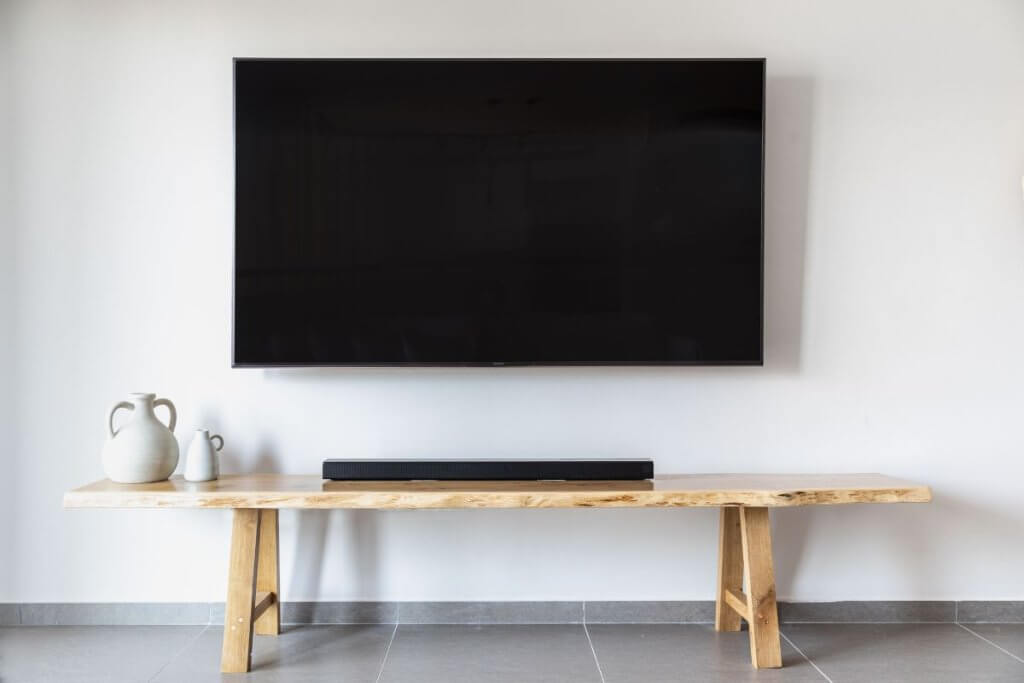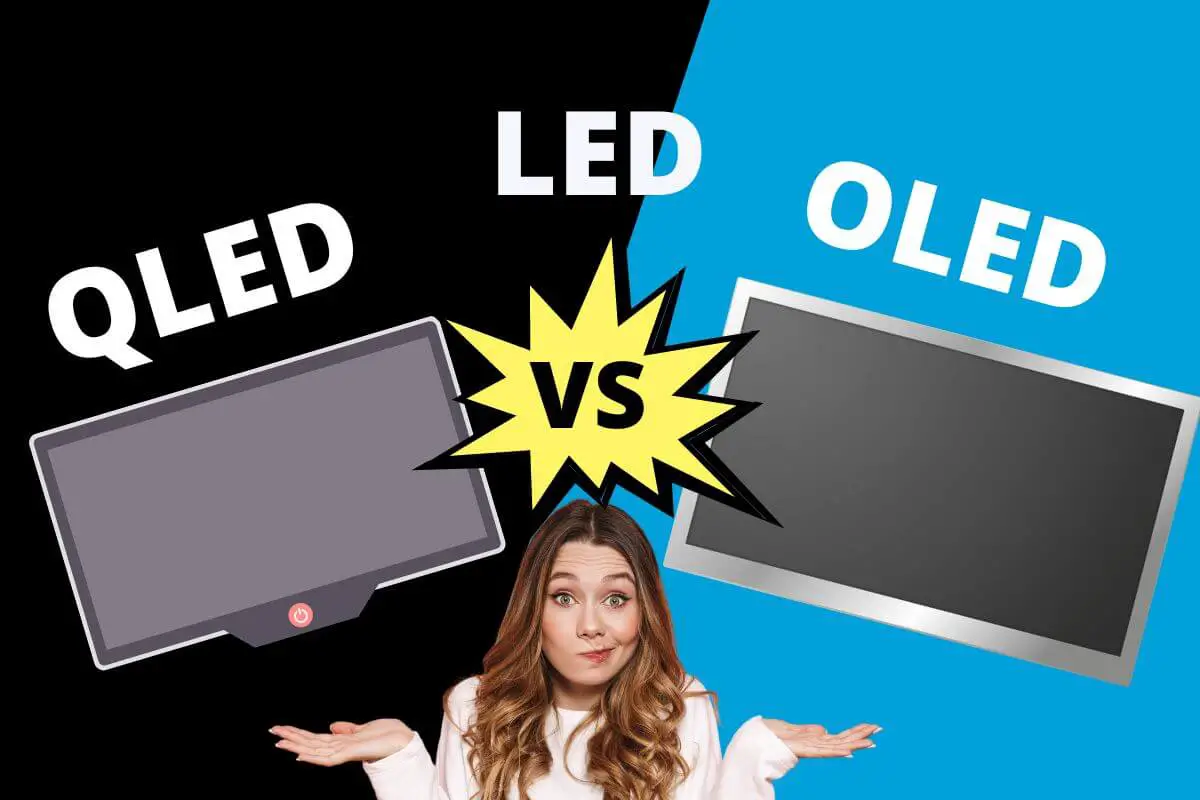The main difference between QLED, LED, and OLED is picture quality. OLED has the highest picture quality, while LED has the lowest. QLED cost more than LED, but offers a higher quality of picture.
Technology is always improving, and this includes TVs. If you’re on the quest to buy a new TV, you might’ve stumbled across specific terms like QLED, OLED, and LED.
These three are some of the top televisions but differ significantly from one another. Check out what you need to know about the latest TV technology.
Table of Contents
QLED vs LED vs OLED
| LED | OLED | QLED | |
| Contrast Level | High contrast ratio. | The color doesn’t bleed outside, therefore a reasonable contrast ratio. | Least contrast ratio. |
| Color Quality | LED has the least brightness and color quality among the three. | OLEDs can display a wide range of colors but can’t display bright colors. | The color and brightness are much wider as compared to other TVs. |
| Brightness | LED TVs make use of backlights, due to which they can produce twice as much brightness as OLED TVs. | OLEDs have a decent brightness. | QLED TVs are the brightest of the three. |
| Response Timing | Have the fastest response timing. | OLED TVs will always have a considerably faster reaction time than LED TVs. | Have a prolonged response time in comparison to the other three. |
| Image Retention Capacity | It will hold minor problems of image retention. | Over time, static pictures may “burn” into the screen, creating a persistent phantom trace. | Eliminates image retention. |
| Angle of Viewing | It is not very good with light and color when viewed from different angles. | OLED TVs provide more realistic light and color. | Have the best light and color. |
| Costing | Cheapest among the three. | OLED TVs often cost the most money. | A better deal for your money may be QLED TVs, which are often more costly than LED TVs. |
What is LED?
LED, also known as Light Emitting Diode, uses LED backlight technology and not fluorescent tubes like LCDs used as a light source. These TVs are much smaller and thinner because of the backlight LED technology. This makes LED TVs more energy efficient and has better contrast levels.
What is QLED?
QLED stands for Quantum-dot Light Emitting Diode and is a type of LED TV. The only difference here is that QLED uses a quantum-dot layer between the LCD panel and the backlight of the TV.

What is OLED?
OLED, also known as the Organic Light Emitting Diode, differs from the older versions of LED TVs.
OLED display is different since it does not use any backlight but instead takes millions of pixels that can change colors or turn off separately.
Difference Between LED vs QLED vs OLED
Contrast Level
The contrast level is the measure between the lightest part of images and the darkest parts. Since QLEDs use backlight technology, they cannot give 100% of the light that comes. QLED TVs have the least contrast ratio.
OLED, on the other hand, uses individual pixels that can turn off at any given time, to produce pure blacks. As a result, the color will not bleed anywhere, and you can have the best picture quality with OLED panels.
LED TVs also use backlight and, therefore, have a high contrast ratio compared to the other two.
Color Quality
LEDs’ color volume and brightness levels are much wider compared to other TVs. This is primarily because of the quantum-dot technology that QLED makes use of.
OLED, however, can display a broader range of colors but can’t display bright colors or have color accuracy. Regarding backlit LEDs, they have little brightness, color gamut, and quality among the three.
Brightness
QLED TVs offer the peak brightness of the three since they use the quantum-dot technology that boosts the light output of different colors. LED TVs also make use of backlights, due to which they can produce twice as much brightness as OLED TVs.
Response Timing
A rapid response time will reduce motion blur on the TV when watching action and sports. OLED TVs will always have a faster reaction time than TVs with LED light since they can instantly modify every pixel and subpixel on the screen.
Image Retention Capacity
Image retention is one of OLED TV’s main drawbacks. This implies that static images (such as news station logos) may “burn in” the screen over time, creating a persistent phantom trace.
Unless you repeatedly watch the same shows or pause the TV screen for a long time, image retention is not a particularly common issue. Get an LED TV if you are concerned about picture retention and want to prevent it completely.
Viewing Angle
You should consider the viewing angle of the television as if many people are simultaneously watching it. When viewed at an angle, OLED TVs provide more realistic light and color than LED TVs because their self-lit pixels release light in all directions.
Cost
OLED TVs often cost the most money but have the highest image quality. A better deal for your money may be found with QLED TVs, which are often more costly than LED TVs.

Does QLED Last Longer Than LED?
Yes, QLED TVs tend to last much longer than LED TVs. The average lifespan of a LED TV is 4.5 years to 7 years, while that of a QLED TV is 10 years at a minimum. This is mostly due to the quantum-dot technology used in working QLED TVs.
Which is Best: QLED vs OLED vs LED?
After observing the different traits of all three, industry experts believe that QLEDs are the best TVs regarding value and performance.
They’re slightly more expensive than LEDs but have high picture quality and a good lifespan. On the other hand, OLEDs are somewhat pricey but show good performance.
If you’ve enjoyed this article, you might like our post on alpha male vs beta male.

